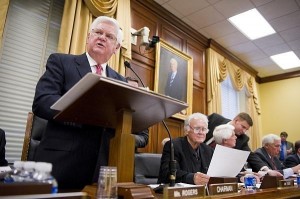 The fight over the Volumetric Ethanol Excise Tax Credit (VEETC) continues. Earlier this week, a coalition of “usual suspects” made up of 90 business associations, taxpayer advocates, hunger and development organizations, agricultural groups, free-market groups, religious organizations, environmental groups, ‘budget hawks’, and public interest groups sent a letter to the Congressional leadership asking them to axe the tax. In addition, they asked them to continue to hold their ground on the anti-ethanol amendments that were included in their version of the Continuing Resolution.
The fight over the Volumetric Ethanol Excise Tax Credit (VEETC) continues. Earlier this week, a coalition of “usual suspects” made up of 90 business associations, taxpayer advocates, hunger and development organizations, agricultural groups, free-market groups, religious organizations, environmental groups, ‘budget hawks’, and public interest groups sent a letter to the Congressional leadership asking them to axe the tax. In addition, they asked them to continue to hold their ground on the anti-ethanol amendments that were included in their version of the Continuing Resolution.
In the letter, the coalition says…
“In particular, Congress has the opportunity to end the $6 billion a year subsidy to gasoline refiners who blend corn ethanol into gasoline. At a time of spiraling deficits, we do not believe Congress should continue subsidizing gasoline refiners for something that they are already required to do by the Renewable Fuels Standard.
Experts like the Congressional Budget Office and the Government Accountability Office have concluded that the subsidy is unnecessary, and leading economists agree that ending it would have little impact on ethanol production, prices or jobs.
We urge you to let VEETC expire and resist calls for spending on infrastructure for conventional biofuels.”
Tom Buis, CEO of Growth Energy responded to the letter saying, “It is efforts like these that perpetuate our addiction to foreign oil. If American consumers had a choice, most would choose the fuel that creates U.S. jobs, reduces harmful emissions and strengthens our national security. Growth energy has proposed reforming ethanol policies in our fueling freedom plan which would redirect the current tax credits toward the build out of infrastructure to deliver access to higher level blends of ethanol.”
The organization believes that with greater access to the market, the ethanol industry can do much more for our economy and environment. “Once the infrastructure is in place, ethanol will be able to compete without government assistance, creating an opportunity where ethanol will continue to create jobs, strengthen our economy and displace foreign oil. But, as we have said before, this investment won’t happen overnight. The one year extension of the ethanol tax incentive gives Congress the opportunity to consider longer term solutions this year,” added Public Affairs Director, Chris Thorne.

